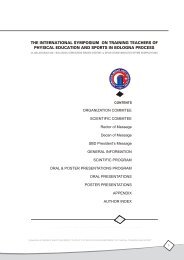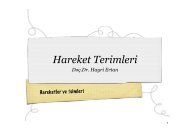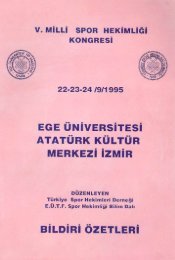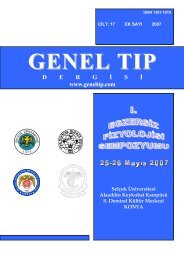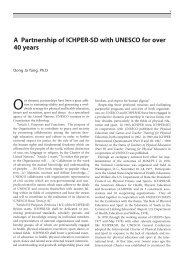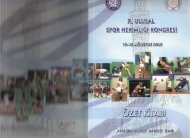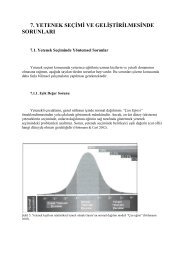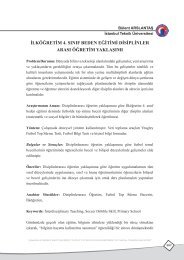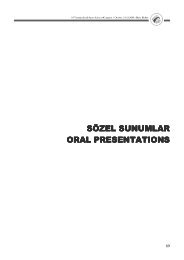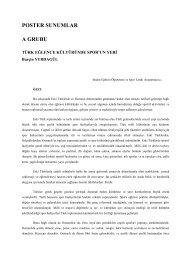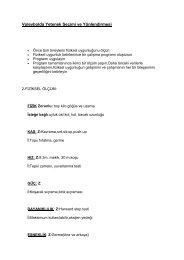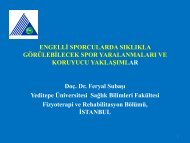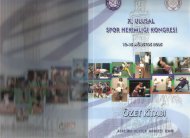KARDÄ°YORESPÄ°RATUVAR EGZERSÄ°Z TESTLERÄ° ... - Spor Bilim
KARDÄ°YORESPÄ°RATUVAR EGZERSÄ°Z TESTLERÄ° ... - Spor Bilim
KARDÄ°YORESPÄ°RATUVAR EGZERSÄ°Z TESTLERÄ° ... - Spor Bilim
Create successful ePaper yourself
Turn your PDF publications into a flip-book with our unique Google optimized e-Paper software.
7.ULUSLARARASI SPOR BİLİMLERİ KONGRESİ27-29 EKİM 2002KONGRE - PANELLERthat is jogging, a brisk walk, a swim or a light training session, for example – when light is required, and to relaxindoors when it should be avoided. This raises the question whether physical exercise and inactivity can, insome way, add to the effects of light and dark respectively. Current evidence is not conclusive.For the first few days in the new time zone, training sessions should not be all-out efforts. Skills requiringfine co-ordination are likely to be impaired and this might lead to accidents or injuries if, for example, racketsports players conducted training matches too strenuously. Where a series of tournament engagements isscheduled, it is useful to have at least one friendly match during the initial period, that is before the end of thefirst week in the overseas country. Subject to these caveats, exercise for soccer players is recommended alsosince it helps them psychologically in their preparations for competition.In practice, therefore, to combine exposure to bright light and exercise, and to combine dim light andrelaxation, would seem practicable. However, there is very little evidence to suggest that exercise by itself willalter the speed of adjustment of the body clock.4.6 NappingNapping can work antagonistically by anchoring rhythms in the time-zone of departure. A prolonged naptake at the time when the individual would be asleep in the country departed slows up the rate of entrainment tothe new local time (Minors and Waterhouse, 1981). Since exercise provides a good antidote to drowsiness,physical activity at such a time would contribute to overcoming this transient fatigue.Individuals arriving in the early morning after an eastward flight may choose to go to bed on arrival. Thisstrategy is useful, provided there is not first a long exposure to the morning‘s sunlight. Going to sleep at thistime has a chronobiological rationale, provided the true trough of core temperature has not been passed.It appears therefore that behavioural methods are preferable to pharmacological means of attempting toalleviate effects of jet-lag. These can be translated into guidelines for travelling athletes based on things to dobefore, during and following the flight.5. Key behavioural factor in coping with jet-lag5.1 PreparationThe main ways of coping with jet-lag are to be prepared for the journey and to plan your behaviourappropriately. Avoid last-minute preparations as far as possible. Research on travelling to Australia in the fouryears leading up to the Olympic Games in Sydney confirms the importance of the last night‘s sleep beforedeparture (Waterhouse et al., 2002).Mimicking the light-dark cycle of the foreign country prior to departure is largely ineffective, as only thesleep-wake cycle is adjusted. Nevertheless, adjustment of bedtime and waking time in a minor way, (but by nomore than 2 hours) can be of benefit in nudging the body clock to change in the proper direction.5.2 While travellingPart of the preparation for the journey will entail working out likely meal times, any stop-overs and time ofarrival in the new time-zone. It is possible also to consider the time at which you will try to sleep on boardduring the journey. Use in-flight entertainment to good effect and means of aiding sleep when the time comesto do so. These include using eye-shades and ear muffs, and reclining the seat as far as possible.Two factors in particular merit closer attention. As the cabin air is dry, there will be a gradual loss of bodyfluid. Consequently, there is a need to take in more fluid than might normally be drunk: water and fruit juices arepreferable to coffee which in large amounts acts as a diuretic. The water also helps in preventing the throatfrom getting too dry. Alcohol is also a diuretic and is therefore best avoided. The second recommendation is toavoid staying in the same cramped posture for too long. Moving around the plane periodically, doing stretchingexercises in your seat even, all help to alleviate stiffness. Besides, these activities safeguard against so-called‗economy class syndrome‘ which refers to deep vein thrombosis, a condition that occurs with blood pooling intothe lower extremities and an increasing tendency for clot formation.351



